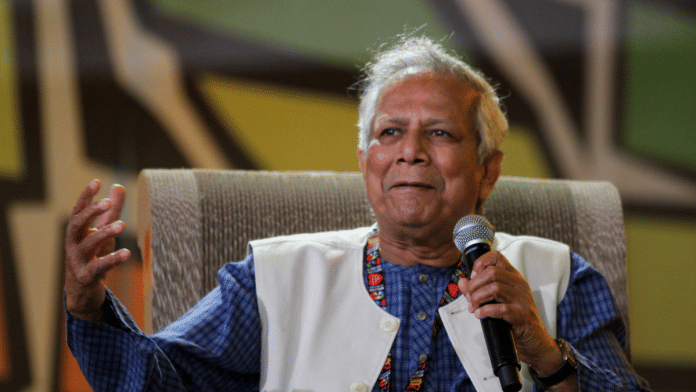New Delhi: Nobel laureate Muhammad Yunus has agreed to become the chief adviser to the interim government, Bangladeshi English daily The Daily Star reported Tuesday. Yunus, who is currently in Paris as a special invitee of the International Olympic Committee, is set to return to Bangladesh as soon as possible.
According to the Bangladeshi daily, an unnamed source quoted Yunus as saying, “If the students can sacrifice so much, if the people of the country can sacrifice so much, then I also have some responsibility. Then I told the students that I can take the responsibility.”
Yunus, the founder of Grameen Bank — a pioneering microfinance bank, which helped lift millions out of poverty in Bangladesh — was convicted of violating the country’s labour laws by a Dhaka court in January 2024, when the Sheikh Hasina-led government was in power, and is currently out on bail.
Earlier Tuesday morning, the leaders of the student movement that led to Hasina’s resignation and flight announced that they wanted an interim government with Yunus as the chief adviser.
Late Monday night, Bangladesh President Mohammed Shahabuddin in an address to the nation announced that an interim government would be formed as soon as possible after the dissolution of Parliament, and ordered the release of former prime minister and opposition leader Khaleda Zia, who has been under house arrest after being convicted on corruption charges in 2018.
Yunus, who has been consistently attacked by the Hasina-led government, told ThePrint Monday that politics was not his “cup of tea” but promised to return to the country and continue with his work in a “more free environment”.
The Nobel laureate also said that while India and Bangladesh would continue to have positive relations, he was hurt that New Delhi called the student protests an “internal affair” of the country, after aiding Sheikh Hasina to remain in power.
Hasina, who fled to India Monday, was finally forced to resign after months of student protests culminated in the “long march to Dhaka” earlier that morning. The protests first broke out in June 2024 over the high court’s reinstitution of the 30 percent quota in government jobs for the families of veterans of the 1971 Bangladesh Liberation War.
On 15 July, the protests turned violent, leading to the deaths of over 200 protesters over the next few days. Eventually, the Supreme Court ordered that 93 percent of government jobs were to be filled on merit, while the remaining 7 per cent would be reserved for veterans families, minorities and persons with disabilities.
The Hasina-led government had originally scrapped the reservations in 2018 before the high Court brought them back in June.
Despite the Supreme Court’s order, a continued crackdown by Hasina’s government led to renewed protests that culminated in Monday’s developments.
Bangladesh Army chief General Waker-Uz-Zaman Monday announced Hasina’s resignation and has assumed the responsibility of ensuring the political transition in the country.
(Edited by Rohan Manoj)
Also read: Bangladesh a ‘free country now’ — Nobel Laureate Muhammad Yunus on Hasina’s resignation






